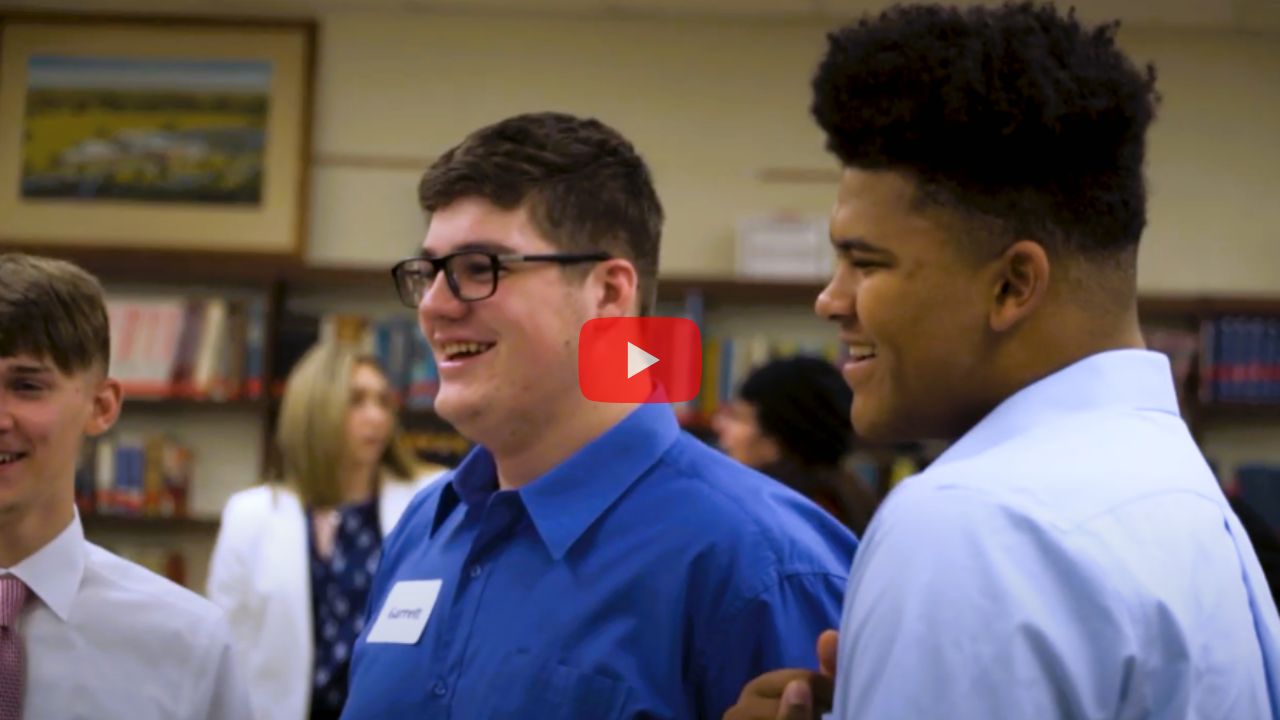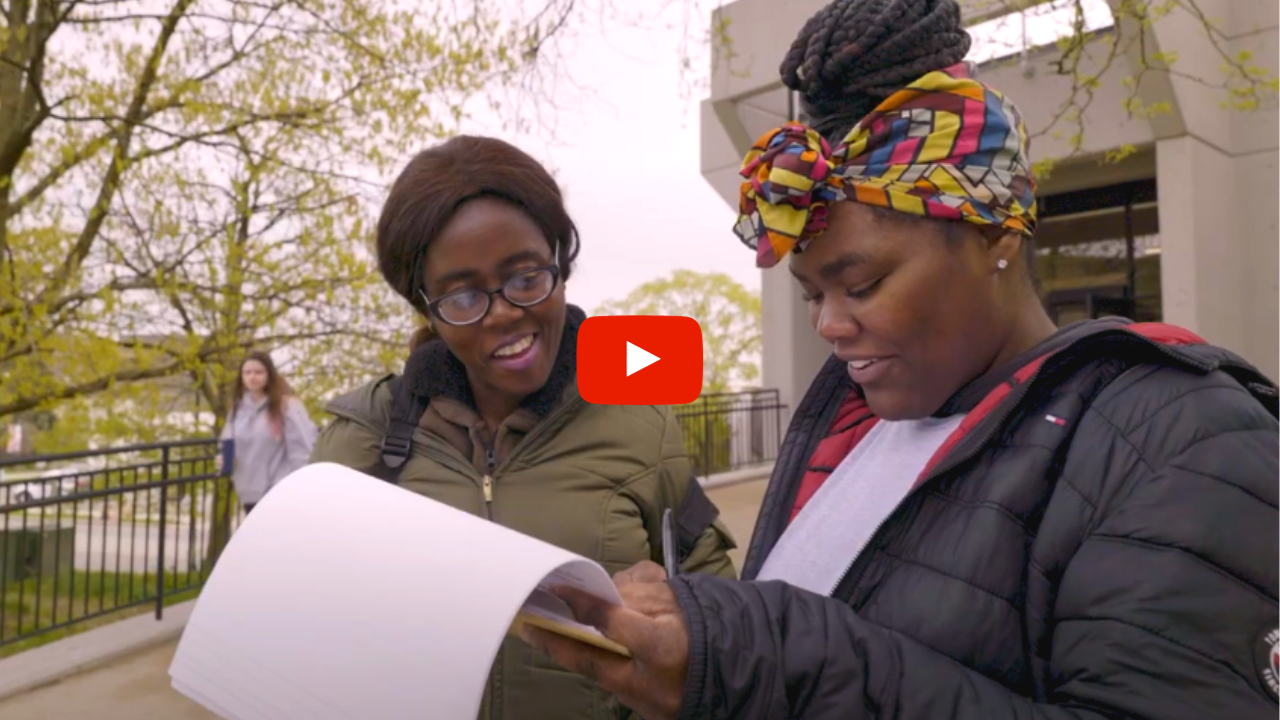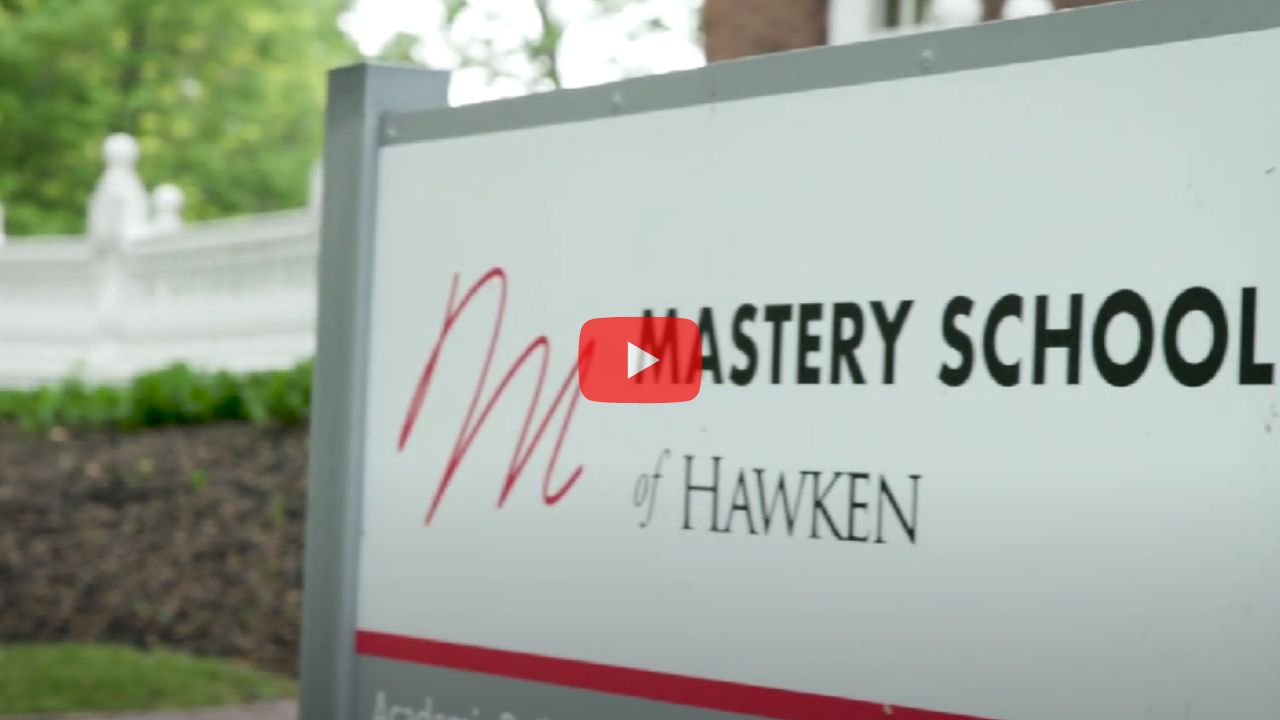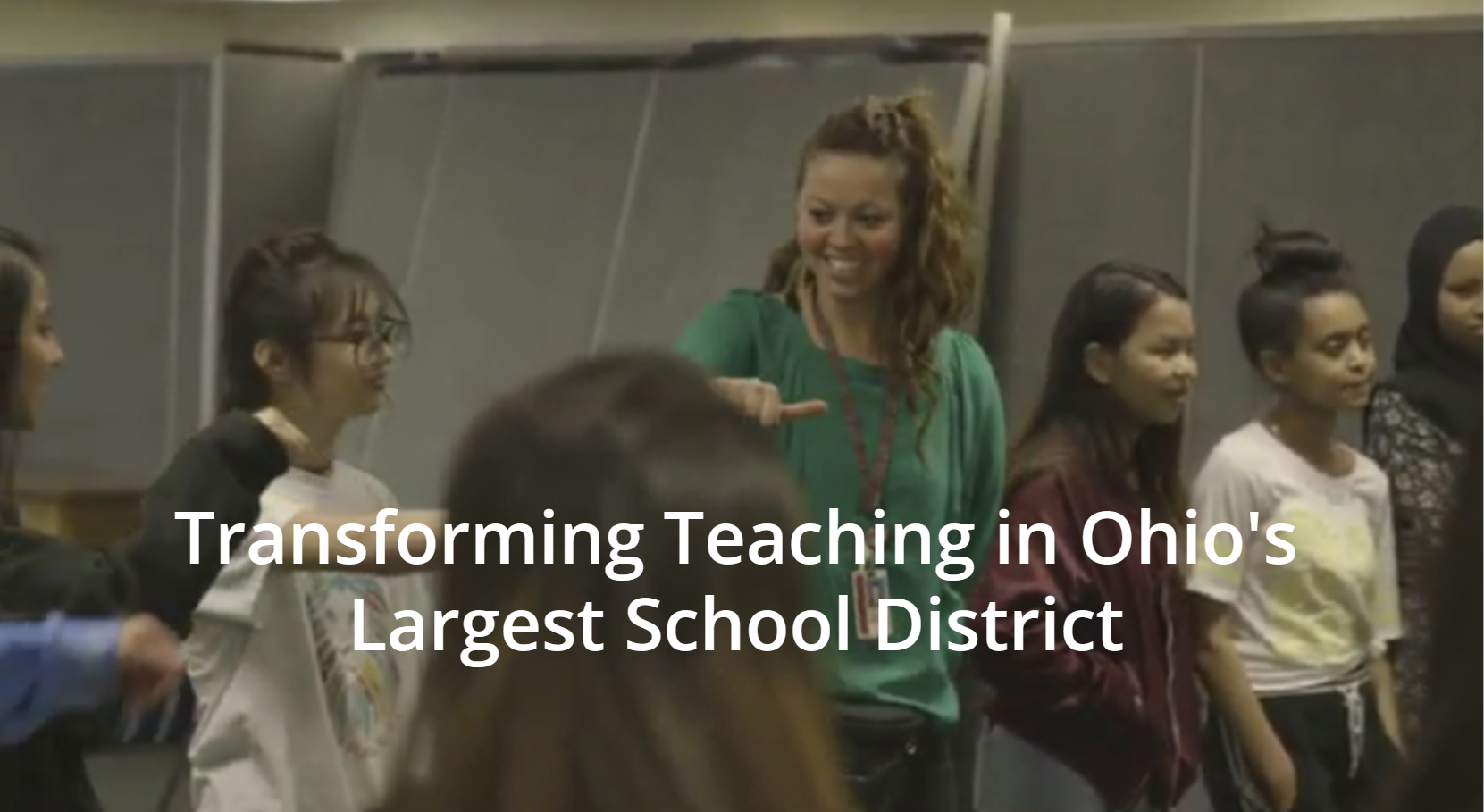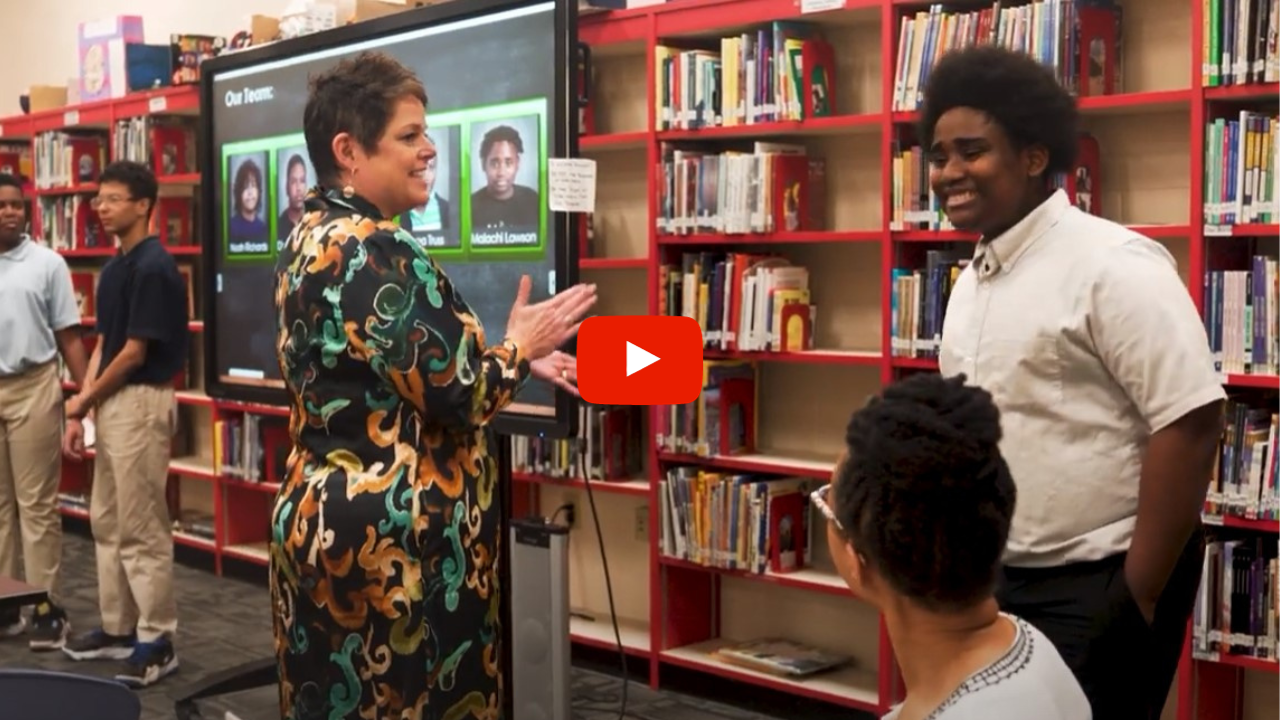In this episode, Doris Korda elaborates on the shift in the workplace where employers increasingly value skills–like teamwork and collaboration–over the possession of content knowledge. Doris and Alison discuss why “you can’t get an A by yourself” and the role of direct, honest feedback in the classroom.
Alison Tanker: So Doris, tell me about the importance of teaming in this course. I know we have collaboration specifically set out as a skill we’re looking to build, but it’s been very intentional how you’ve set up the course to be team-based and I was hoping you could discuss that now.
Doris Korda: Sure. So it’s actually really weird in schools to do a class that is entirely team-based like this. Hawken is a wonderful school, it’s a college preparatory school. Grades matter, it’s competitive, performance matters, it’s wonderful, progressive . . . But still the whole college admissions game as you know, gruesome as it is, is by nature competitive. Someone gets in and someone doesn’t.
So the whole system isn’t set up well for a class where you’re getting three academic credits and grades, where two of the three grades are 100% based on your work as part of a team. So that’s a weird thing.
So if I don’t feel like working hard, you want to get an A, we’re on the same team, you get you’re a wonderful straight-A student and you get a B on your report card as a senior in this crazy honors class, and it’s Doris’ fault. You don’t get a chance to tell the college that. It hurt . . . So it’s not a simple thing, actually.
When you get out of school, anything you’re doing that is hard, that you’re doing over time, that is worthwhile to you, most of those things are not individual pursuits.
Most of what you do, even if it’s something you say well, no, actually, if I’m a writer or I’m a this or a that, it’s just me, it’s all of what I . . . well, I actually could find lots of examples, I think we all get it, where your ability to work well with others can make or break you. Right?
Alison: Absolutely.
Doris: What report after report, research after research—recent—that is focused on the changing demands of the workplace and the workforce not meeting, matching the demands. It’s all about skills, right?
Alison: Right, the skill set.
Doris: We don’t have critical thinking, problem solving. The other is collaboration. People get out of school, the highest-performing, academically performing students, don’t necessarily have any skill at being generative when working as a team.
Most work, a lot of work, is with others, and you don’t even get to choose your team most of the time. Right? You’re thrown into something, these are the people you’re doing it with, it’s really important work, you guys, you make or break it.
So to answer your question simply, I really wanted the entire course to be team-based, and I thought it was really important. It’s been really interesting to develop it, the feedback systems, the problem-solving curricula, the assessments, the communications and assignments, all that stuff that we’ve developed, given that it’s entirely team-based, it’s been very interesting.
The learning management system, the project management tools, all that stuff, like you can’t separate that out. It’s crazy. The first day of class, you heard me, I say to the students, “You can’t get an A by yourself.” Now they nod their heads, but they don’t really get it, right?
Alison: Right.
Doris: Then each one of them gets it, right? They get it.
Alison: Yeah, yeah.
Doris: What happens when, all right, what this class is about is you’re going to have to solve this really complicated, hard problem, and four of you, maybe three, depending. You have a deadline and you’re going to have to do everything you can – none of you have the background or experience – you’re going to have to band together and do the best you can to come up with the best.
So first of all, that the problem is real for a real business makes the kids really passionate and driven to solve it and do a good job.
It takes about three weeks or four weeks, but at some point they really, really understand, “Wow, okay, I really can’t get an A by myself. And I can’t, no matter how hard I try, unless I have three other really high-functioning members, and unless we as an organism are high functioning, we’re not going to do a great job.” I’ve seen what happens if you do function well, wow, that’s what we need to try to do.
So there we have them. They’re motivated. They want to learn this thing, how to work well. So you get students who come in the door and absolutely are train wrecks when it comes to working with others. We had one this semester.

Alison: That’s right.
Doris: Right? Nobody wanted to work with this kid, right? It’s not an unusual thing. That kid and the other kids quickly realized that kid has to get better, has to figure it out, has to learn. And everybody’s learning is different, everybody’s growth is different.
Some students come in and it’s more natural for them, just like it is in the real world, there are people who are naturally great collaborators and people who are not, for whom it’s something they have to focus on and they have to learn techniques.
So the other thing that happens is very, very early in this class, it is . . . students start to engage with this in a professional academic way, that this isn’t . . . and one of the other lines I say on the first day is, “If your feelings get hurt easily, get over it.” Right?
Alison: Right.
Doris: Remember that? And we talk about why do you actually want people to give you the tough feedback. We have a real conversation about it. We don’t just say it, we throw out examples, we ask them questions, we get them to say to us, “Yes, actually, I want someone to tell me that wasn’t really effective, try it again. I want someone to tell me, you know, when you said that, you used so many ‘likes,’ I didn’t even know where you . . .” or whatever it is.
Then what happens is they get to a place . . . so much of the curriculum is about talking about recognizing strengths, recognizing deficits, appreciating strengths, finding ways to use those and leverage those in yourself, in others. What it takes to make a good team and good teamwork. We give them lots and lots of techniques, teamwork sorts of things, lots of them. You’re stuck as a team, don’t know where to go next, what are some things you can try. All those different things.
You are having an issue between two of you. What are some of the strategies that work? Which one do you think would work this way? Well, given her personality and his personality, maybe this one. Yeah, let’s try that one. Should you do it, should I do it? Well, let’s have her do it. We have conversations when the team’s leader in the class, when teams are having crazy horrible moments, right?
Alison: Yeah.
Doris: Where we’re very direct with them. We’re saying okay, here’s what’s going on. We have the following choices. We instructors can negotiate this, and here’s what we would do if we do it. Or if you guys want to do it yourselves and you have a plan for doing it, you can do it. What do you think is better? So it becomes a very explicit part of the course, it’s an academic, actually, part of the course, to learn how to be generative as a team, and all that is required in that. Communications . . .
Now, we talked before about citizenship. This also is a huge part of developing, not only collaborative skills but citizenship, right? Because you have to be thinking actively, constantly about the other person, what they’re feeling, what they’re thinking, where they’re coming from, what their tendencies are. How you can make them feel great about what they’re doing in the same way that you want to feel great about what you’re doing.
You have to. You can’t succeed if you don’t do those things. Those things do not in any way come up in most of school. And for many, many people, none of that is natural. And so we really hurt these students, I think, who are going out into this particular world where collaboration’s massively important by doing very little during their school years to develop that.
Then they think they’re A+ students, they’ve gotten 5s on all their APs, they’ve gotten all kinds of awards, they’re valedictorian, they go to Harvard, they get their accolades, they get their fabulous degree, they get their first job, and they’re miserably, disastrously failing in the first, whatever it is, because other people don’t want to work with them.
They have no idea, they don’t know why. They don’t have any of the tools required to even figure it out, let alone fix it. You can’t blame them because there’s not been any conversation about it.
You have students now, with all our technology, and social media and numbers of likes and friends and whatever, students grow up with . . . There’s hard numbers around what’s changed in terms of interacting during the day. So that numbers of hours per year that a typical high school student spends face-to-face interacting with another human being has gone down by huge numbers. There’s got to be some impact to that.
Alison: Certainly.
Doris: So they’re not having the time and the experience opportunity to develop some of the skills that we’re seeing with all this technology they most need. It’s kind of crazy.
Alison: Absolutely.
Doris: What’s interesting is that once the students get over the shock to the system that is this class and they start engaging in it, here’s what’s really interesting. They crave the feedback, even the critical feedback. You saw it. They’re dying to get that feedback. So the first time they do a project, the very first time, and afterwards we say okay, we construct a feedback exercise where they’re going to have feedback as a team reflecting on how they did in the last three weeks, and we prompt them, we ask specific things.
Then we’re going to do the same thing one on one. I’m going to have a conversation with you, you’re one of my teammates, that’s just you and me, and I’m going to give you, here’s my strength sandwich about you, right? Here’s where I think you’re really strong, here’s where I think you really, blah, blah, blah . . .
Alison: Need some work.
Doris: . . . and here are my hopes as you head into your next team. Then you do the same with me. Then we do it with each . . . so everybody does it to everybody. You get this like wow, this, it’s such a gift. You get multiple gifts, right? And it’s not just the teacher saying okay, you get an A, you did a great job, Alison, on da-da-da.
You just spent three weeks working like crazy, intentfully, on this really hard thing, culminating in a presentation that you’re really proud of. You have this experience, nobody can take it away from you, with these three other people.
You had more of an experience with the three other people on your team than you did with your instructors, for sure. Then you, having gone through that with each other, you get to hear the 16- or 17-year-old tell three other people who really got to work with you closely, what they learned about you, what they saw, what they appreciate, what’s cool about you.
So there’s a substantive confidence that every one of these students develops over the course of this course. If they learn even more, not only about themselves, but they learn it through how others experience them, that’s crazy powerful stuff. They become starved for it. And they also get so good at giving feedback well, at themselves learning when is it important to give feedback even if it’s critical.
If it is critical, how do we do it in a way that is thoughtful and considerate and actually helpful. How do I resolve conflicts? They have conflicts, they have any . . . they have to find a way to resolve them because you have a deadline. You have to get there, you can’t just ignore it.
So all of these things that I would call, if we’re talking about school as a preparation for life, for work, for success, for contribution, my gosh, these things are necessary to that.

Alison: Absolutely. The fact that in the course as well, I know you make a point of exposing the students to all the different people that are in that classroom. So you set up different teams for each of the different projects they work on, and that they’re exposed then to a variety of personalities and working styles and thought processes and all of this.
By the time they get to the final project, when they actually form their own teams, some really interesting dynamics happen there where they even pass up maybe a close friend because they know working style isn’t a good fit for that team.
Doris: Absolutely.
Alison: And so imagine they’re that self-aware when they’re coming out of this course and going out, understanding how their strengths mesh with other people’s on a team and what their weaknesses are and how that can bounce off, I think is really incredible to watch that develop over time.
Doris: Yeah, and it’s funny, when I’m listening to you, it reminded me, so when I was teaching math all those years and I know you’ve heard me say this, the one class I really always insisted on teaching, the one no one else wanted to teach, was the one with students who’d failed math the year before or were coming from other schools and didn’t have the background.
The reason that was so exciting to me is because that’s where I learned the most, trying, and I developed strategies to get those kids who don’t thrive in traditional school to thrive and to learn this heavy-duty stuff.
What I saw was, we have in our schools that there’s this sort of black-and-white thing happening, where you either can get this easily or you don’t. If you get it easily, you’re smart, and if you don’t, you’re not. They’re very specific things.
I was experiencing student after student after student who by sixteen or fourteen had already concluded they were stupid, or they couldn’t be successful or they weren’t smart or they weren’t academically strong. It was based on such narrow, limited data. But they’re kids and they’re trying to figure themselves out, right?
Alison: Right.
Doris: So when I said that doing this entire class in teams and having such a rich curriculum that’s all about collaborating and teaming and all that develops a substantive confidence, this is what I’m talking about.
When you go through school, if no one really spends the time with you and you’re not somebody who’s intrinsically motivated to perform on that test, if we don’t spend time with you, if somebody doesn’t point out to you, there’s always that risk that you make conclusions about yourself and they’re not good.
That by the time you get out of school you’ve already developed these insecurities or feelings of inadequacy or kind of come to conclusions about yourself that are really limiting, it’s a very dangerous thing.
There’s also this whole perfectionist tendency thing, and that’s a whole nother topic, but that we breed when we have this crazily test-based, that your whole childhood comes down to, are you the fastest runner, are you the captain of the team, did you get an 800 on your SAT, did you get a 5 on your AP, do you have a 4.8, are you . . . like, it’s craziness, right?
We can talk all we want as adults, but “Oh, honey, what I care most about is you, you have such a good this or a good that.” But these students aren’t stupid. Their entire world that they’re growing up in is reductive and has said okay, they can say whatever they want, you’re going to get in or not get in, you’re going to be successful or not successful based on how you do on this and this and this, and that’s it.
So when they go through a process like this, a course like this, an experience like this, they learn themselves, that nobody’s perfect, everybody has strengths, everybody has tons and tons of things that are not so strong with, and that doesn’t constitute being smart or not smart, being successful, not successful.
You get deeper into all that in a way that is really crucial, not only at that age but in this time. In this time, I believe personally, and I’ve believed this since I started teaching and saw what was happening to these students. It’s very sad to me, what we’ve done, and culturally, what’s happening. It’s very, very important.


